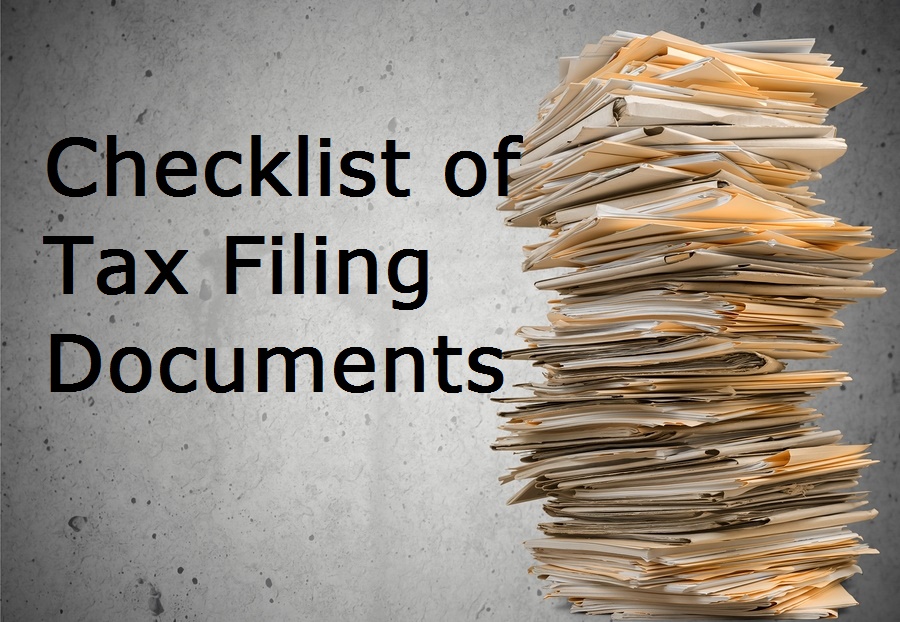5 Essential Documents for Your Tax Return Preparation

Preparing your tax return can be a daunting task, especially with the intricate details involved in ensuring all required documents are in order. This blog post will guide you through the five essential documents you need to have on hand when preparing for your tax return, ensuring you're fully compliant and potentially eligible for any tax deductions or credits available to you.
1. Proof of Income

The foundation of your tax return is your income documentation. Here's what you'll need:
- W-2 Forms: For employees, this form summarizes your annual wages, the taxes withheld, and other pertinent income information. Your employer should provide you with this form by January 31st.
- 1099 Forms: If you've freelanced, done side gigs, or received any other form of income not covered by W-2, expect to receive various 1099 forms. These include:
- 1099-NEC for freelance and contractor work
- 1099-MISC for miscellaneous income
- 1099-INT for interest income
- 1099-DIV for dividend income
- Unemployment Compensation Statement: If you received unemployment benefits, you'll get Form 1099-G to report this income.
- Other Income Statements: Include any additional income from retirement accounts, social security benefits, or gambling winnings. Each source might have its own specific form or statement.
🔍 Note: Remember to keep records of any income not reported through these forms, such as self-employment income or foreign earnings.
2. Records of Expenses and Deductions

Documenting your expenses can significantly impact your tax liability. Here's what to gather:
- Charitable Contributions: Receipts or acknowledgment letters from charities for any donations made throughout the year.
- Medical Expenses: Bills, receipts, and statements that show payments made for medical services, equipment, or medications.
- Education Expenses: Form 1098-T from educational institutions, student loan interest statements, and records of any educational material purchases.
- Business Expenses: Detailed logs or receipts for business-related travel, office supplies, utilities, or home office expenses for self-employed individuals.
- Tax Credits: Documentation for any qualifying expenses like child care or energy-efficient home improvements.
These documents not only help in itemizing deductions but can also provide eligibility for various tax credits, reducing your overall tax bill.
3. Investment and Retirement Documents

Managing your investments and retirement accounts requires meticulous documentation:
- 1099 Forms: As mentioned earlier, these forms are crucial for reporting income from investments like stocks, bonds, and mutual funds.
- Investment Summary: A year-end summary from your broker detailing capital gains or losses, dividends, and interest income.
- Retirement Account Statements: Contributions to IRAs, Roth IRAs, 401(k)s, or other retirement accounts need to be documented, including any distributions made.
4. Records of Major Life Changes

Life events can significantly impact your tax situation. Keep records for:
- Marriage or Divorce: Marriage might offer a chance for joint filing, while divorce requires updates to your tax status.
- Birth or Adoption: Additional tax credits might be available for child-related expenses.
- Home Purchase: Mortgage interest and property tax statements for potential deductions.
- Income Changes: Documentation for any significant changes in income, including job changes or unemployment.
5. Miscellaneous Documents

Other documents might not fit into the above categories but are still crucial:
- State Tax Refunds: If you received a state tax refund last year, this might need to be reported as income.
- Alimony Paid or Received: If you're affected by pre-2019 divorce agreements, document these payments.
- Moving Expenses: While not deductible for all in 2023, some specific circumstances might still qualify.
Proper organization of these documents streamlines the tax filing process, ensuring accuracy in your filings, and potentially reducing your tax burden through eligible deductions and credits.
| Document Type | Description |
|---|---|
| W-2 | Employee earnings summary from your employer. |
| 1099-NEC | Income from freelancing or contractor work. |
| 1099-MISC | Miscellaneous income not covered by other forms. |
| 1099-INT | Interest income from banks or other financial institutions. |
| 1099-DIV | Dividend income from investments. |

⚠️ Note: Even if your income is solely from freelance work or self-employment, you must still report it accurately, using Schedule C of Form 1040 to itemize your income and expenses.
In wrapping up, the importance of having these documents at your fingertips when preparing your tax return cannot be overstated. Not only does it simplify the filing process, but it also ensures you don’t miss out on potential tax savings through deductions and credits. Regularly updating and reviewing these records throughout the year, rather than just during tax season, can greatly reduce stress and potential errors in your tax filings. Moreover, by keeping meticulous records, you ensure you’re in compliance with IRS regulations, potentially avoiding penalties or audits. As we’ve detailed the essential documents for your tax return preparation, remember that organization and early preparation are your best allies in managing your financial obligations effectively.
What should I do if I haven’t received my W-2 form by the end of January?

+
If you haven’t received your W-2 form by the end of January, contact your employer immediately. If they fail to respond, you can file a Form 4852 with the IRS for substitute wage and tax statement.
Are there any new tax credits or deductions for 2023?

+
Yes, tax laws change annually. For 2023, there might be adjustments in credits like the Child Tax Credit, the Earned Income Tax Credit, or new deductions related to green energy initiatives. Stay updated through IRS announcements or consult with a tax professional.
Can I deduct home office expenses if I work from home?

+
Yes, if you are self-employed, you can deduct expenses related to a home office that is used exclusively and regularly for business activities. This includes a portion of utilities, rent or mortgage interest, and other related expenses.